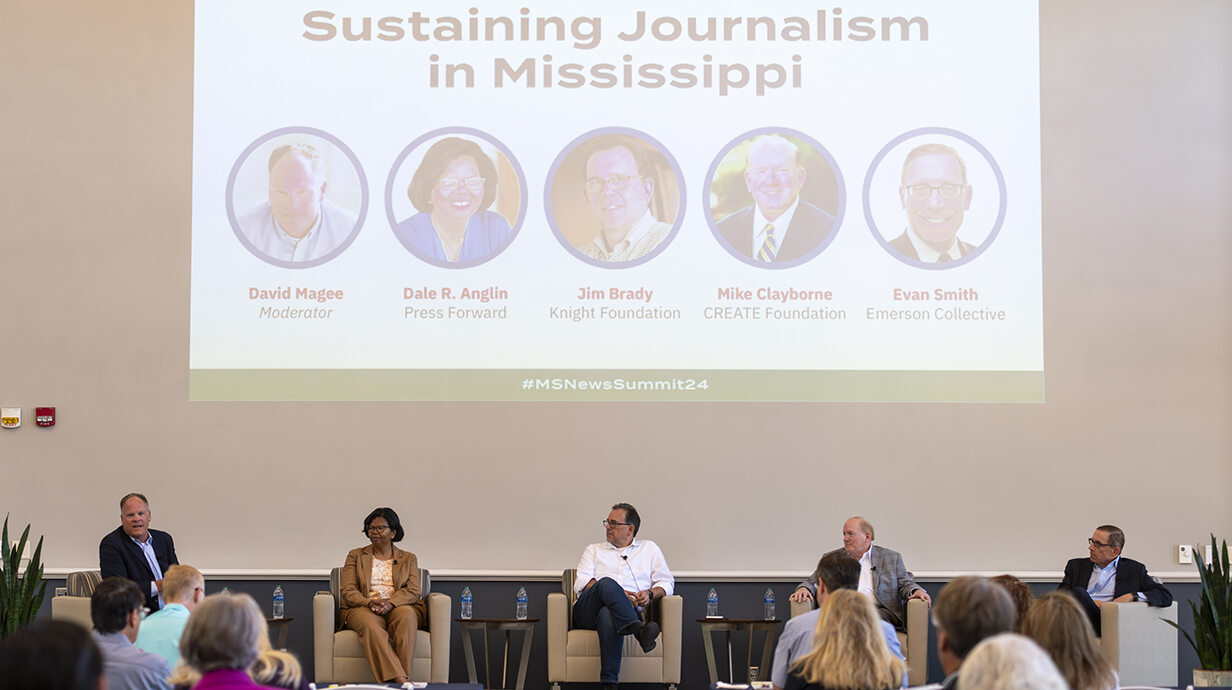What does it take to become a Press Forward local chapter?
We’ve been thrilled with the enthusiasm of place-based foundations nationwide that want to form their own chapters. In just a few months, we’ve eagerly welcomed 25 chapters in our network, from Alaska to South Florida.
Launching a chapter is one way for place-based foundations to make an enduring impact on their local journalism ecosystem. We hope local chapters will be one of Press Forward’s most significant achievements and aspire to have chapters in every state. However, forming and sustaining a chapter can be challenging and requires commitment, capacity, and creativity.
Since launching the first set of Locals last fall, we have honed in on the key ingredients that prepare chapters to build support for local news in their backyards. First, let’s define the expectations and activities of a Press Forward chapter.
Locals act as “mini–Press Forwards” in their communities. I say this because what we do at the national level is being replicated by chapters nationwide. They conduct research to understand what community members want from local news, map out the existing media ecosystem, and develop a grantmaking strategy. They galvanize their fellow foundations and bring in new donors to this effort– most of whom have never invested in journalism. The work involves leading a culture change by convincing donors that local news is a public good and needs investment, just like the arts, libraries, and public health.
Press Forward, meanwhile, supports chapters in myriad ways, from offering up to $250,000 over two years in Catalyst Funds to help them grow to creating a peer network of support and an upcoming suite of toolkits on key topics.
As more foundations consider applying to form chapters, we would like to share what we look for as we evaluate applications.
1) First and foremost, your group must be funder-led.
Chapters are principally donor collaboratives designed to raise funds to widen (and deepen) the pie of support for local news. They also hold existing relationships with other foundations and donors.
We’ve seen different types of funders take the helm of Locals. Community foundations have stepped up to lead in a big way and lead 15 of our current chapters. A funder’s network is leading the effort in Central Appalachia. They are building off their experience of activating funders across a six-state footprint. Others are working in collaboration with foundation entities. For example, Press Forward Minnesota is housed at the Minnesota Council on Foundations. In partnership with McKnight Foundation, a family foundation, the Minnesota Council on Foundations administers and leads the pooled fund, governance structure, strategy, and operational support”. In Pittsburgh, we have a university and four local foundations co-leading together.
Here are the additional elements we are looking for in potential chapters:
2) You have experience bringing donors together.
Whether you’re a small or large community, fundraising will be a big part of the chapter’s success. Donor cultivation will take one-on-one conversations and testing out messaging.
We’d love to see previous experience with donor collaboratives. The ability to bring in other funders and established processes to work together allows a chapter to move more quickly.
The Lancaster chapter leaders, for example, had experience building a STEM funders group. In South Florida, The Miami Foundation led a rapid response effort to raise funds for the victims of the Surfside condo collapse. Prior experience and the muscle memory that comes with it are important.

David Magee (left), author and media entrepreneur, leads a discussion at the inaugural Local News Summit at the University of Mississippi. Panelists are (from left) Dale Anglin, of Press Forward; Jim Brady, from the Knight Foundation; Mike Clayborne, of CREATE and Press Forward Mississippi; and Evan Smith, from the Emerson Collective. Photo by Srijita Chattopadhyay/Ole Miss Digital Imaging Services
3) Your community has experimented with, or has considered, your approach for funding in news and information.
We’d like to see how a chapter lead has thought about news and information in their existing grantmaking.
In Northeast Iowa, for example, the community foundation conducted a series of community listening sessions called Small Town Dreams, asking people what they wanted for the future. Many replied that they wished to have better access to news. So, the community foundation decided to fund a reporting position there through Report for America.
In Northern Michigan, the community foundation had yet to fund local journalism, but it connected with media and local leaders and found a similar need for local news and information. The foundation provided the data when approaching Press Forward. These are great signs of chapter readiness.
As you can see from these examples, community research and establishing relationships with local media organizations are integral to establishing a chapter. This research concerns the community’s information needs and the makeup of a local news and information ecosystem.
In the application process, we’re looking for the applicant’s awareness and understanding of what their community might need and the questions they might look to uncover.
4) Your potential chapter understands the staff time involved and the specialized consultants you may need to hire.
Chapters require different capacities and skill sets at different stages of their journeys. Most chapters start by conducting fundraising and media ecosystem research. What types of specialized consultants will be needed during that stage, and what staff is needed to support them?
Press Forward does offer Catalyst Grants that chapters can use to pay for these costs. Chapters have used the funds to hire fundraising consultants, research teams, and marketing specialists.
When you apply, we want to hear your thinking about your team’s availability and the gaps and limitations in your current staffing.
If you’re interested, please get in touch.
We understand there is a lot to consider. Not every community has considered these topics, and that’s fine, too. Whether your community checks all these boxes, we still want to hear from you.
If you’re interested in forming a chapter, fill out this application. If you are still in the exploratory phases, fill out the form and let’s set up a call.
We’re looking forward to exploring this journey with you.

